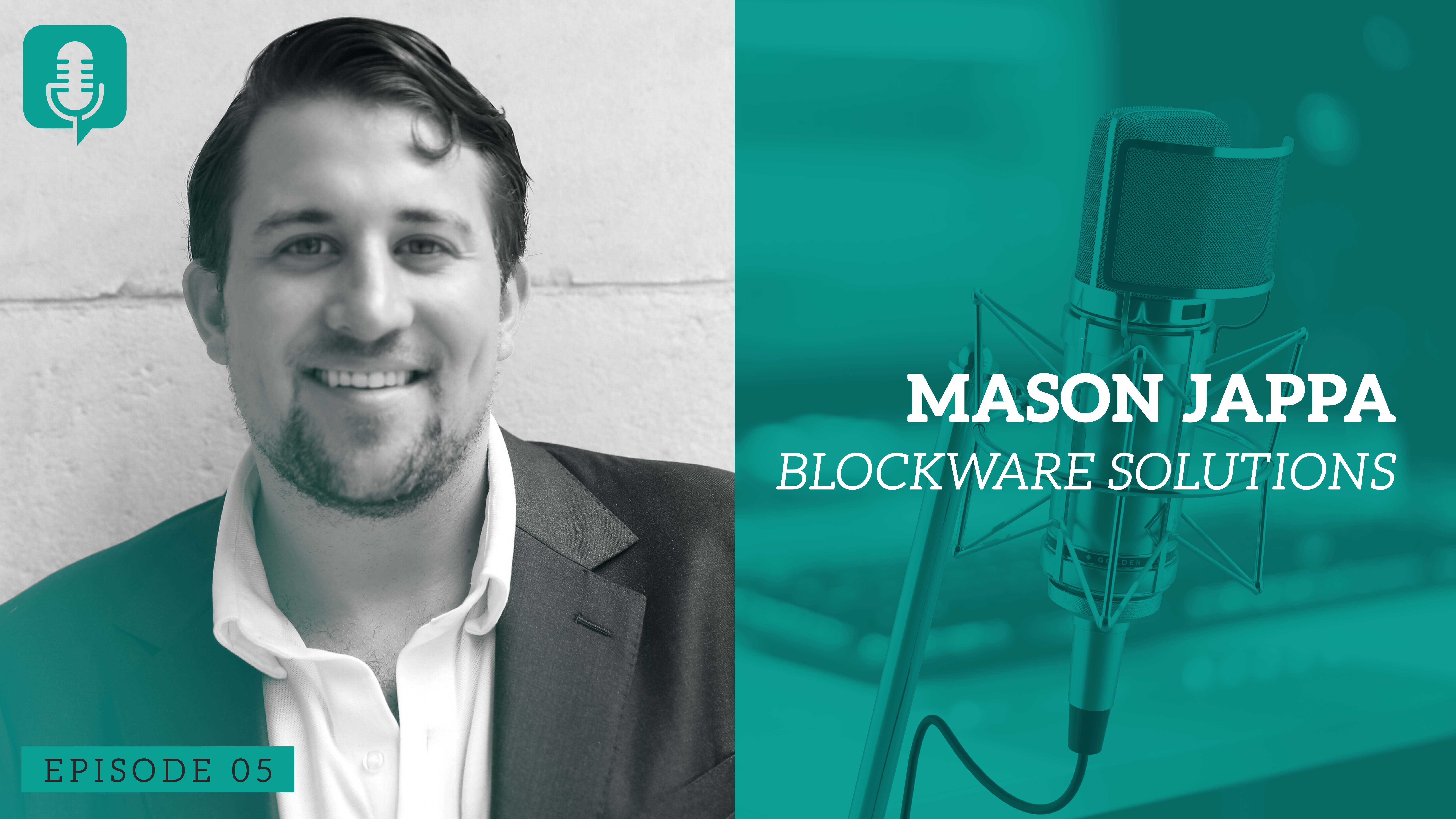In the ever-evolving world of Bitcoin and cryptocurrency mining, few names carry the weight and respect of Mason Jappa, CEO of Blockware Solutions. In Episode 5 of the Sazmining Podcast, host Will Szamosszegi sits down with Jappa to delve into the intricate world of Bitcoin mining—from sourcing hardware and building infrastructure to the economic and geopolitical forces shaping the future of mining.
With experience spanning finance, IT, and blockchain, Jappa offers listeners an insider’s view of the multi-billion-dollar mining industry. In this blog post, we break down the key insights from the episode, exploring the challenges of sourcing mining hardware, the strategic advantages of mining in the United States, and the growing institutional interest in Bitcoin infrastructure.
The Birth of Blockware: From Personal Mining to Global Influence
Mason Jappa’s journey into the mining industry didn’t begin with a fascination for Bitcoin—it began with servers. Coming from a family in manufacturing, he had access to warehouse space and excess electricity. While exploring ways to monetize this setup, Jappa discovered cryptocurrency mining.
By 2017, Jappa and his late co-founder Matt Suza launched Blockware Solutions, identifying a clear gap in the market: reliable, transparent, and U.S.-based access to mining hardware. At the time, purchasing ASICs (application-specific integrated circuits) from Chinese manufacturers like Bitmain was an unreliable and opaque process, fraught with currency conversion risks, shipping delays, and uncertainty.
Blockware was founded to solve these challenges—and they hit the market at the perfect moment, just ahead of Bitcoin’s 2017 bull run.
The Challenges of Sourcing Bitcoin Mining Hardware
Jappa recalls the early days of staying up until 4:00 AM to secure mining machines during Bitmain’s sporadic batch releases. Because these companies didn’t accept USD wires and only accepted Bitcoin payments, mining hardware procurement became an elite club limited to those with access to large amounts of crypto.
Today, the landscape has matured—but not entirely. The hardware market is still dominated by two key manufacturers: Bitmain and MicroBT (makers of Whatsminer). While smaller players like Innosilicon, Ebang, and Canaan still exist, they lag behind in performance, efficiency, and chip quality.
Key Takeaways:
- Access to the newest ASICs remains competitive and relationship-based.
- Public mining companies and institutional buyers now lock in large orders months in advance.
- Brokers have shifted from sourcing new units to reselling used and secondary market hardware.
This ongoing scarcity and high demand have pushed the importance of strategic partnerships and long-term supply agreements to the forefront of mining operations.
Bitcoin vs. Altcoin Mining Hardware: Risk vs. Reward
One of the most valuable segments of the podcast is Jappa’s breakdown of the differences between Bitcoin mining and altcoin mining.
Bitcoin miners typically pursue a long-term strategy, leveraging machines like the Antminer S19 or Whatsminer M30S with ROI (return on investment) periods between 18–24 months. These miners are betting on the long-term appreciation of Bitcoin and see mining as a means to dollar-cost average (DCA) into the asset at a lower-than-market cost.
In contrast, altcoin mining (e.g., Ethereum, Zcash) is often a short-term, speculative play. Miners aim to:
- Acquire hardware early—ideally in the first production batch.
- Quickly mine and sell the coins during a profitability window.
- Resell the hardware before it becomes obsolete.
Altcoin mining carries greater volatility and market timing risk, but it also offers faster ROI potential—if executed perfectly.
Powering Profits: The Role of Electricity Costs in Mining Economics
Electricity is the single most important operational expense for any miner. But as Jappa emphasizes, low rates alone are not enough.
The best mining locations balance:
- Cheap and stable energy (ideally under 3 cents/kWh).
- Cool climates to reduce cooling costs.
- Reliable internet to ensure consistent uptime.
- Political and regulatory stability to avoid government interference.
While China still dominates global hashrate (estimated at 65% during the podcast recording), Jappa argues that the United States is quickly emerging as the premier mining location due to its combination of excess energy, favorable regulation, and technological infrastructure.
Blockware, for example, operates a facility in Kentucky in partnership with a steel mill, accessing surplus energy from a substation dating back to the 1930s.
Why the U.S. Is Poised to Lead the Next Era of Bitcoin Mining
As capital floods into mining, the U.S. has become a hotspot for new facilities. According to Jappa, mining in the U.S. offers:
- Energy abundance: From hydro in the Pacific Northwest to wind and solar in Texas.
- Regulatory protection: Unlike some nations, the U.S. has private property laws and judicial recourse.
- Job creation and tax revenue: Mining operations stimulate local economies, particularly in underdeveloped regions.
- Public-private partnerships: Miners often enter demand response agreements, voluntarily reducing power consumption during peak demand to stabilize the grid.
These advantages are turning heads in institutional circles. Mining is no longer the Wild West—it’s a sophisticated infrastructure play with billion-dollar implications.
The Institutionalization of Mining: Loans, Funds, and Hedge Fund Inflows
Jappa explains that the days of mining being a niche retail hobby are fading. Today, some of the most active players in the space are public companies and investment firms deploying hundreds of millions of dollars in capital.
Key developments include:
- DCG’s Foundry offering equipment financing and loans.
- Blockware’s own mining fund, which pioneered a sale-leaseback financing model to reinvest in new machines.
- Defi (decentralized finance) platforms exploring lending models backed by mining hardware.
Notably, Fidelity has also posted Bitcoin mining-related job listings, a strong signal that major financial institutions are preparing to enter the space more formally.
Forecasting the Future of Mining: A 3-Year Outlook
Jappa provides a clear, data-driven view of what the mining landscape may look like in the next one to three years.
- Hashrate will continue to increase as more S19s and Whatsminer units come online.
- Difficulty will rise, making efficiency critical.
- Retail miners may be squeezed out if they can’t access competitive hardware or sub-5 cent electricity.
- Consolidation is likely, with large players absorbing more market share and smaller operators focusing on niche or renewable-powered setups.
However, Jappa remains optimistic. He believes there will always be a role for retail miners—especially those who co-locate with trusted providers or form mining pools.
Understanding ROI: It’s Not Just About the Numbers
Many new miners obsess over ROI calculations—but Jappa argues that these models often miss two critical variables:
- Appreciation of mined Bitcoin: If BTC appreciates from $10K to $50K over the machine’s lifespan, your earnings skyrocket—even if the number of BTC mined remains constant.
- Exit value of hardware: Machines have resale value. Even outdated miners like the S9 still hold value today.
Ultimately, a miner’s strategy—whether they HODL all mined BTC or sell it to fund operations—will have a major impact on long-term profitability.
The Power of Education and Community
Blockware’s mission goes beyond profit. Jappa and his team are passionate about educating new miners and welcoming newcomers to the space. Unlike some brokers who only cater to large buyers, Blockware is committed to working with clients at all levels—even those buying just one machine.
This philosophy is rooted in decentralization. A diverse mining network isn’t just good for security—it’s essential to the ethos of Bitcoin.
Final Thoughts: Why Now Is the Time to Get Involved
Jappa’s final message is clear: Bitcoin mining is here to stay, and now is one of the best times to get involved. With the latest hardware, a post-halving environment, and capital inflows reaching new heights, the opportunity for profitable mining—particularly in the U.S.—has never been greater.
If you’re considering getting into mining, focus on:
- Partnering with experienced brokers and co-location providers.
- Securing favorable energy contracts.
- Building a long-term strategy that aligns with your investment philosophy.
As institutional investors and global infrastructure giants stake their claims in the Bitcoin mining ecosystem, the groundwork is being laid for a more decentralized, resilient, and secure Bitcoin network.
Connect with Blockware Solutions
Interested in mining? Visit blockwaresolutions.com to learn more, access mining research, or connect with Mason and the team.
Stay informed. Stay decentralized.
Subscribe to the Sazmining Podcast
Enjoyed the episode? Don’t miss out! Subscribe to the Sazmining Podcast for more conversations with blockchain innovators and industry leaders.
Follow us on YouTube, X, and LinkedIn.
Discover all episodes at https://creators.spotify.com/pod/show/sazmining.
If you want to hear us interview a particular guest on a future episode, please reach out to us@podcastsamining.com.

